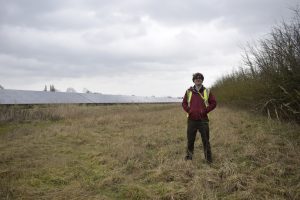Celebrating International Biodiversity Day!

To celebrate, World Biodiversity Day our Asset Manager Harry Barlow has shared a blog from the field. Harry talks about how, by putting nature first we’re creating a safe and welcoming home for birds, insects and small mammals.
The 300 children that visited our solar farm in May would no doubt agree that we are providing a much needed refuge for birds and insects from intensive agricultural activity. Two years ago, we decided to implement a light touch approach to managing the grassland, cutting only areas that would otherwise compromise the solar farm’s production.
We saw in May this has led to an increase in rodent activity: parting any almost area of grass revealed a network of well trodden tracks used by mice and voles. It was no surprise therefore that we have a resident Kestrel, observed almost every day by the children to be hunting in the long grasses around the mature hedgerow in which she is very likely nesting. In quiet anticipation one group of children were lucky enough to see her dive for prey – sadly unsuccessfully – but a rare sight nonetheless. This wasn’t their only treat: Green Woodpecker, Yellowhammer and Red Kite were frequently observed foraging within the site.
Our observations came shortly after the RSPB published research undertaken in partnership with Cambridge University found that – hectare for hectare – solar farms in agriculturally dominated East Anglia contained a greater number of bird species and overall number of birds than surrounding arable farmland, by nearly three times. This wasn’t always the case – only solar farms ‘managed for nature’, providing mixed habitat observed healthy numbers.
We are proud to be managing our community project with nature as a priority, not only the grassland, but our hedgerow and beneath the panels, and delighted to be observing the results. We have partnered with Exeter University to undertake acousting monitoring of bird and bat species this summer as part of a research project investigating the impact solar farms have on surrounding ecology, and look forward to sharing the outcomes when published.
We invite you, this biodiversity day, to take notice of the birdlife where you are, and if you are lucky enough to have a garden, consider how you can help. You don’t even need a garden to support the critically endangered Swift, mounting a specialised swift box to an exterior wall is all that’s necessary.


Join our Board of Directors
We’re looking for new volunteer Non-Executive Directors to join our Board.
...read more